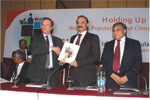Women continue to be at the forefront in confronting damages from climate change in Pakistan. This has been revealed in the UNFPA’s Pakistan Supplement “Holding Up the Sky: Women, Population and Climate Change” to be launched on 19 January 2010 in Karachi. The publication examines issues related to links between family planning, reproductive health, gender equality and their impact on the future course of climate change. The report maintains that climate change will not only endanger lives and livelihoods of the most vulnerable groups in Pakistan but will also exacerbate gaps between rich and poor and inequality between women and men.
Mr. Daniel B. Baker, UNFPA Country Representative in Pakistan introduced the various aspects of the reports. He underlined several challenges in particular that rapid population growth could lead the total population to double by 2050 if urgent measures are not taken. Fertility and maternal mortality rates remain the highest in the region and some other key human development indicators are also deteriorating. In short, climate change can further exacerbate the daunting challenges already faced by the country. Hence, population growth is an influential factor in the increase in greenhouse-gas emissions as well as constituting a constraint on the ability of countries to adapt to the multiple impacts of climate change. “Pakistan clearly demonstrates the cause-and-effect dynamics of population growth as a case study of what the entire world faces as it struggles to cope with rapid climate change”, said Mr. Baker.
Prof. Dr. Mohammad Nizamuddin, Vice Chancellor of University of Gujrat shared the main findings of the report. He reiterated how the international community is concerned about the status of under-developed and developing countries facing the severity of climate change. He pointed out that Pakistan with the sixth largest population in the world produces only 0.4% of the world’s total greenhouse gas emissions (GHG), which means that it is 135th on the list of global GHG emitters. The irony is that while the country contributes very little to global warming, it still faces the challenge of climate change in almost all its manifestations. The Pakistan supplement provides significant information on the exceptional increase in temperatures in Pakistan, changes in weather patterns, environmental degradation, air pollution, deforestation, water pollution, and land degradation.
While giving his remarks, the Chief Guest, Mr. Kamran Lashari, Federal Secretary, Ministry of Environment shared that the Government of Pakistan has already taken certain important initiatives including a comprehensive development framework, but it requires accelerated and sustained actions in future years to cope with the multiple challenges being posed by climate change. He wholeheartedly appreciated UNFPA’s commitment on the issues of population and reproductive health and hoped that the Fund would continue to forcefully demonstrate its support to the Government of Pakistan. The Ministry of Environment is keen to work with UNFPA as both share a collective vision of environmentally sustainable social and economic development in Pakistan, said the Secretary.
He stressed the need to engage all the stakeholders ? policy-makers, decision-makers, parliamentarians, civil society and media ? in an on-going debate on understanding the issues in order to mitigate the effects of climate change. The Secretary congratulated the UNFPA Representative for this unique initiative. He reiterated that the Government is committed to work closely with UNFPA and other partner departments to address the emerging challenges for the welfare of people of Sindh province. As this report details, the urgent issue of global climate change is shown to be a significant result of population dynamics. He stressed that the interaction between population and environment is one of the key concerns that needs to be highlighted in the communication and advocacy strategy of the Government.

